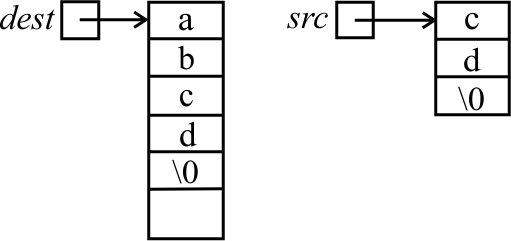|
strlen(s) returns the length of null-terminated
string s. The length does not count the
null character. For example, strlen("rabbit")
= 6.
Note. strlen finds the length by scanning through the null-terminated string looking for the null character. So computing strlen(s) takes time that is proportional to the length of the s. Avoid computing strlen(s) over and over for the same string s in the same function. That violates the standards for this course. |
|
Do not compare strings using ==.
If s and
t have type char* then expression
s == t is true if s and t
are the same pointer. It does not
look at the characters in either of the strings.
Function strcmp compares strings s and t for alphabetical ordering or for equality by examining their characters. strcmp(s,t) returns an integer r with the following properties.
For example, strcmp("cat", "cab") > 0 since "cat" comes after "cab" in alphabetical order. Alphabetical ordering is determined by character codes. Since 'Z' has code 90 and 'a' has code 97, Z comes before a in the alphabetical ordering used by strcmp.
|
| Strcasecmp is like strcmp, but it ignores the case of letters. So 'r' and 'R' are treated like the same character. |
|
strcpy(dest, src) copies null-terminated string src
into array dest and null-terminates dest. The caller
must ensure that there is enough room in array dest
for the entire string plus the null character at the end.
The return value of strcpy(dest, src) is dest. However, the standards for this course require you not to make use of the value returned by strcpy. |
char* strncpy(char* dest, const char* src, size_t n);
| strncpy(dest, src, n) is like strcpy(dest, src), but array dest has size n, and no more than that many characters are copied. (If there is not room, no null character is stored in dest.) Do not make use of the result returned by strncpy. |
|
strcat(dest, src) copies
string src to the end of the string in
array dest, adding a null character to the end.
For example, suppose that dest and src start out as follows. 
After doing strcat(dest, src), the picture changes to the following. 
The value returned by strcat(dest, src) is dest. However, the standards for this course require that you not make use of the result returned by strcat. There is a common misconception about strcat. Statement
char* c = strcat(a,b);
does not set c to the concatenation of string a
followed by b. It adds b to the end of the string
in array a. So what is in array a is changed.
Strcat does not allocate any memory. (This is one reason
that the standards require you not to make use of the result
returned by strcat.)
|
char* strncat(char* dest, const char* src, size_t n);
| This is like strcat(dest, src), but at most n characters are copied from src. Do not use the result returned by strncat. |
|
strchr(s, c) returns a pointer to the first occurrence of character
c in null-terminated string s. If
there is no such character, strchr(c, s)
returns NULL.
(The type of strchr is a poor one. Since parameter s has type const char*, strchr should not be able to return a non-const pointer into array s, since that gives you a back-door way to modify a constant string. However, the library designers really wanted to provide two different functions: const char* strchr(const char* s, int c); char* strchr(char* s, int c);That is possible in C++, but not in C. The type of strchr is a compromise that works in both C++ and C, relying on the programmer not to abuse it.) |
| strstr(haystack, needle) returns a pointer to the first occurrence of substring needle in string haystack, or returns NULL if there is none. Both haystack and needle must be null-terminated strings. |